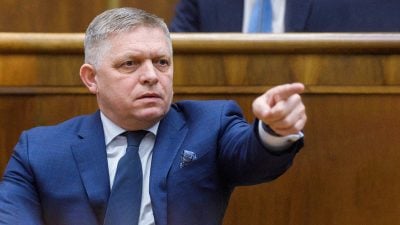Sending NATO Soldiers to Ukraine Is “Apocalypse Warning,” Says Slovak Prime Minister

All Global Research articles can be read in 51 languages by activating the Translate Website button below the author’s name (only available in desktop version).
To receive Global Research’s Daily Newsletter (selected articles), click here.
Click the share button above to email/forward this article to your friends and colleagues. Follow us on Instagram and Twitter and subscribe to our Telegram Channel. Feel free to repost and share widely Global Research articles.
Big Tech’s Effort to Silence Truth-tellers: Global Research Online Referral Campaign
***
The Prime Minister of Slovakia, Robert Fico, said on March 2 in a video posted on social media that sending soldiers from the European Union and NATO to Ukraine could precipitate a global apocalypse. The social media post was made on the same day that the Slovakian foreign minister met with his Russian counterpart Sergey Lavrov.
Fico also highlighted Ukraine’s inability to resolve the conflict despite the West’s substantial financial and military aid. He emphasised that an EU and NATO military presence in Ukraine could potentially alter the dynamics of the conflict and trigger catastrophic consequences.
“The West sees that, despite significant financial and military aid, Ukraine is incapable of resolving this armed conflict,” said the Slovak prime minister, adding: “The situation could change with the arrival of EU and NATO military personnel in Ukraine, but then there would be nothing left but to wait for the arrival of the global apocalypse.”
Fico highlighted the pressing need for modern air defence systems for Ukraine but warned that the West could not provide these systems without a commitment to maintaining and operating this equipment. He argued that sending Western military personnel would only worsen the conflict rather than resolve it.
French President Emmanuel Macron said on February 27 during a conference of European leader that he does not rule out sending troops from Western allies to Ukraine and announced a coalition to deliver missiles to the Ukrainian Army.
“There’s no consensus today to send in an official, endorsed manner troops on the ground. But in terms of dynamics, nothing can be ruled out,” declared Macron.
However, several NATO members, including Slovakia, ruled out the possibility of on-the-ground support for Ukraine which has been part in armed conflict for more than two years.
It is recalled that on February 26, Fico warned when speaking ahead of a meeting of EU and NATO national leaders in Paris that several EU and NATO members are considering military deployments to Ukraine. He cited a “restricted document” listing topics to be discussed in Paris that “sends shivers down your spine.”
“These topics,” the Slovak said, “imply that a number of NATO and EU member states are considering sending troops to Ukraine on a bilateral basis. I can’t say for what purpose or what they would do there.”
According to Fico,
“This [Paris] meeting is confirmation that the Ukraine strategy of the West has completely failed.”
Macron’s statement was intended to send a strong warning to the Kremlin, but it failed miserably since his comments revealed Western divisions and disagreements instead. German Chancellor Olaf Scholz led the group of European leaders who disagreed with Macron’s claim that NATO had not ruled out sending troops, whilst Washington abandoned Paris in the idea of sending troops and let the French president receive all the flak.
A survey of 12 European Union countries, commissioned by the European Council on Foreign Relations and published on February 21, reveals that only 10% of respondents believe Ukraine can defeat Russia. Furthermore, only 31% of respondents favoured Europe supporting Ukraine until it regained lost territory, while 41% favoured Europe pushing Ukraine to negotiate a peace agreement with Russia.
Unlike many of his European counterparts, Fico acknowledges the reality that Ukraine cannot win the war with Russia. For this reason, Fico sent Foreign Minister Juraj Blanar to hold talks with his Russian counterpart on March 2 on the sidelines of a diplomatic forum in Turkey, a rare high-level encounter between a European Union member state and the country Brussels has attempted to isolate.
The Slovakian prime minister highlighted that the meeting “was an example of our balanced and sovereign [foreign policy],” adding that Blanar and Lavrov spoke about the possibility of a Ukraine peace summit in Switzerland.
For his part, Blanar said in a statement that the war did not have a military solution and urged peace talks. The foreign minister added in the statement that he told Lavrov that Slovakia was against creating an “iron curtain” between Russia and the EU, and its position was based on respect for international law principles, such as territorial integrity and sovereignty.
Fico returned to power after winning an election in 2023 on promises to stop state military aid to Ukraine and has been critical of anti-Russia sanctions. The leftist populist leader also recently said the West’s approach to the Ukraine war is “an absolute failure,” which, as observed by the European Council on Foreign Relations survey, is what most EU citizens also believe. Fico joins Viktor Orban, prime minister of neighbouring Hungary, in resisting major pressure from Brussels and Washington to relent on their efforts to normalise with Moscow, and his actions once again demonstrate the fractures in the EU and NATO.
*
Note to readers: Please click the share button above. Follow us on Instagram and Twitter and subscribe to our Telegram Channel. Feel free to repost and share widely Global Research articles.
Ahmed Adel is a Cairo-based geopolitics and political economy researcher. He is a regular contributor to Global Research.
Featured image source

